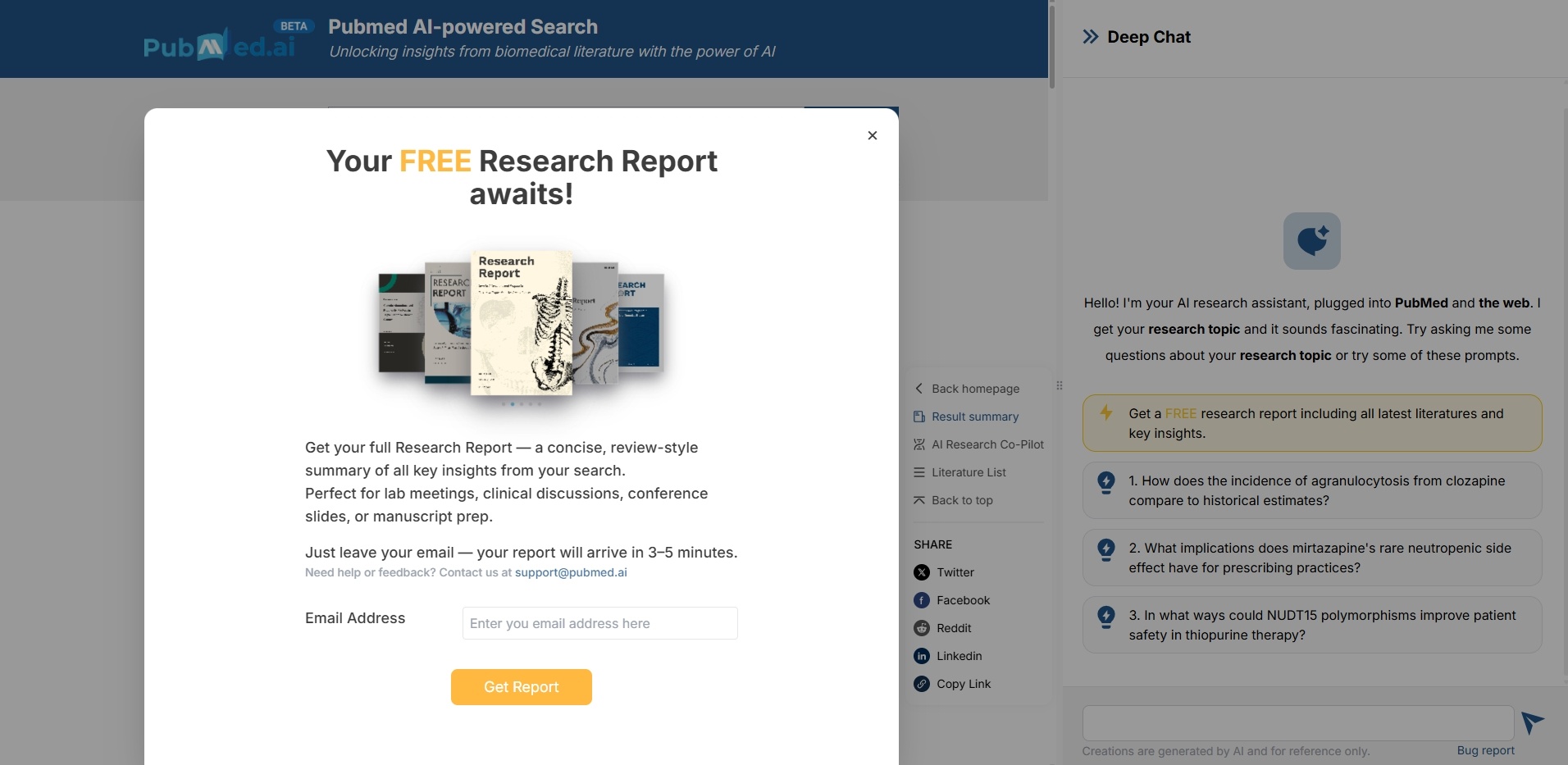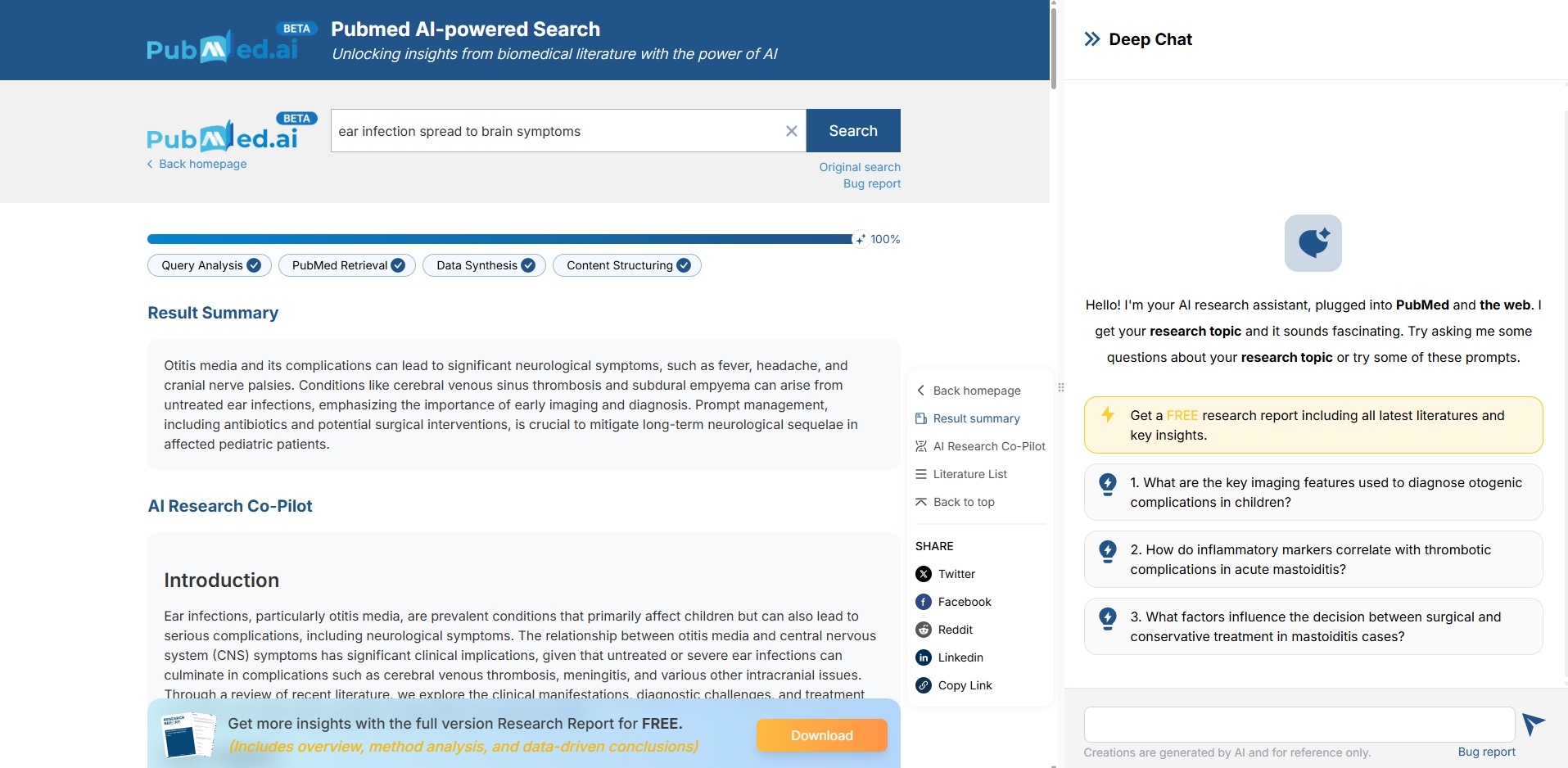How to Use PubMed.ai’s Research Report?- With Real Report Example
Writing a structured, well-referenced research report is often time-consuming and stressful. PubMed.ai’s Research Report feature is designed to solve this problem—by automatically generating complete medical reports based on your literature search activities, with smart referencing, academic structure, and downloadable formats delivered right to your inbox.
Whether you're a researcher, clinician, student, or pharma professional, this tool can save hours of manual work and deliver polished, ready-to-use documents in minutes.
What Is PubMed.ai’s Research Report?

Research Report is an AI-powered reporting tool that automatically generates a well-structured research report based on your search activity on PubMed.ai. It rely on your search queries to:
- Analyze the topic and scope of your interest
- Find and cite additional relevant PubMed literature
- Generate a report with academic sections: Abstract, Introduction, Methods, Results, and Conclusion
- Deliver the final report in PDF and Word formats, along with a full reference list
📧 Once generated, your complete report package is sent directly to your email inbox.
What’s Included in the Report?
Each automatically generated Research Report from PubMed.ai follows a formal academic structure and includes the following core sections:
-
Abstract
A concise and professionally written summary highlighting the research focus, core objectives, and key takeaways. -
Introduction
More than just background context and theoretical framework, the Introduction section also includes a topic-specific overview based on your actual PubMed search terms, summarizing the scope and intent of your query.
In addition, PubMed.ai enhances the introduction by incorporating supplementary insights and references, which are automatically retrieved beyond the original search scope. This ensures the report not only reflects what you searched for, but also offers broader academic depth. -
Research Methods
This section outlines the common methodological patterns and study designs identified within the articles retrieved by your search. Rather than summarizing random literature, it synthesizes recurring approaches, sample types, analytical tools, or trial structures that emerge from your PubMed search results. -
Research Results
Summarizes the key findings, patterns, or clinical outcomes found across the documents retrieved through your search. This section is generated by aggregating information from the actual set of articles relevant to your query—ensuring it's tightly aligned with your research intent. -
Conclusion
Offers a cohesive interpretation of the results and closes the report with evidence-backed insights drawn specifically from your search results. It may also point toward research gaps or next-step opportunities based on the findings. -
References
The report itself includes an in-text reference list of expanded PubMed articles that are semantically related to your query.
A separate Excel (.xlsx) file is included in the download folder, providing the full reference list in a structured format.
Smart Literature Extension and Referencing
One of the most powerful aspects of PubMed.ai’s Research Report is its intelligent reference expansion.
- Goes beyond your original search to include additional relevant, high-quality PubMed articles
- Formats citations in your APA style
- Includes source links and metadata (PMID, authors, publication year,DOI...)
This ensures your final report is not only well-written but also credible, verifiable, and publication-ready.
Delivery Format: What You’ll Receive

After you click “Get Report”, PubMed.ai will compile and email you a zipped folder containing:
- Word (.docx) File – Fully editable research report
- PDF File – Professionally formatted version ready for submission or sharing
- Reference List File – Includes detailed information, formatted citations, and PubMed links
This makes it easy to use the content as-is or further refine it for publication, presentations, or academic submissions.
Who Should Use Research Report?
| User Type | Use Cases |
|---|---|
| Medical Students | Course assignments, review articles, background research |
| Researchers & Scientists | Systematic reviews, project proposals, research briefs |
| Clinicians | Evidence-based summaries, treatment insights |
| Pharmaceutical Professionals | Market analysis, drug research reports, internal documentation |
| Educators | Teaching materials, research summaries for students |
How to Generate a Report (Step-by-Step)

1. Search your topic on PubMed.ai
Example: “ear infection spread to brain symptoms”
2. Click “Download”
- Click “Download” Button
- Or click Get a FREE research report including all latest literatures and key insights.
3. Wait a few moments
PubMed.ai will analyze your search data, find additional literature, and compile the report.
4. Check your email
You’ll receive a zipped folder with your report in multiple formats.
Why Choose PubMed.ai’s Research Report?
| Feature | Benefit |
|---|---|
| Academic Report Structure | Includes all key sections of a formal research report |
| Extended Citations | Adds relevant literature beyond your search history |
| Email Delivery | No downloads needed—get everything via email |
| Dual Format Output | Editable Word + polished PDF formats |
| Time-Saving | Cuts down 90% of the time needed for literature synthesis |
Further Reading You Might Like
Want to learn more about maximizing PubMed.ai for medical writing? Check out these guides:
- Best Guide to Learn PubMed Advanced Search [Steps + Real Examples]
- NEJM Impact Factor 2024: What Researchers Should Know
- Does Garlic Kill Measles Virus? Debunking the Myths
Final Thoughts: Smarter Medical Writing Starts Here
The Research Report tool from PubMed.ai is a game-changer for anyone dealing with medical research. By combining intelligent literature search, academic writing structure, and seamless delivery, it empowers users to produce high-quality reports with minimal effort.
Ready to experience it yourself? Visit PubMed.ai and generate your first AI-powered research report today!
Sample Preview: What Does a PubMed.ai Research Report Look Like?
Curious to see what a fully generated PubMed.ai Research Report actually looks like? Here are some real samples (pdf):
Comprehensive Analysis of Somatic Mutations and Genetic Variants in Various Cancers
Synthesis of Recent Research on Type 2 Diabetes and Associated Health Outcomes
Synthesis of Recent Research on Traumatic Brain Injury (TBI)
📩 When you generate your own report, the full PDF and Word documents—along with a complete reference list—will be emailed directly to you in a downloadable folder.
Disclaimer:
This AI-assisted content is intended for academic reference and informational purposes only and does not constitute medical advice, diagnosis, or treatment. Always consult qualified healthcare professionals regarding any medical condition or treatment decisions. All risks arising from reliance on this content are borne by the user, and the publisher assumes no responsibility for any decisions or actions taken.

Have a question about biomedical research or published clinical studies? PubMed.ai helps you explore published biomedical literature with AI assistance.
Subscribe to our free Newsletter